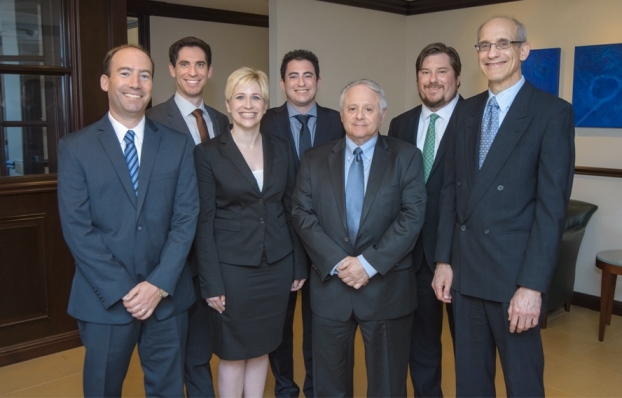Franchise 101: No Poach for You; and Cannbiz Accounting
 Southern California Tier 3 Best Lawyers in Franchise Law 2018 bkurtz@lewitthackman.com
Southern California Tier 3 Best Lawyers in Franchise Law 2018 bkurtz@lewitthackman.com
dgurnick@lewitthackman.com
tgrinblat@lewitthackman.com
swolf@lewitthackman.com
msoroky@lewitthackman.com
kwallman@lewitthackman.com
tvernon@lewitthackman.com
July 2018
Webinar: Ready to Franchise? Here’s What You Need to Know
Franchising is one, key way to expand a business, but it’s not the only way. Those looking to grow their business and expand their brand through franchising should consider their options carefully. In this webinar, Tal Grinblat, Certified Specialist in Franchise Law (State Bar of California Board of Legal Specialization) and Katherine L. Wallman, an 11 year veteran in both corporate and franchise law, will discuss:
- Five Elements of a Successful Franchise System
- Steps to Begin Franchising
- State Registration Requirements
- Franchise Relationship Laws
- And much more…
Attorneys and Accountants attending this webinar may be eligible for CLE or CPE continuing education credit. Please add ESQ or CPA after your last name in the registration form if seeking credit. Click RSVP to register for this event.
FRANCHISOR 101:
No Poach for You

Franchise agreements commonly prohibit the franchisee from soliciting or hiring workers employed by the franchisor or other franchisees. This may take the form of “no-hire” or “no-switching” clauses that prohibit hiring each other’s employees, or “non-solicitation” clauses that prevent a franchisee from soliciting another franchisee’s employees. These “anti-poaching” covenants have come under government scrutiny, due to the concern that they unfairly hold down wages for millions of employees working in quick and full-service restaurant, automotive and other franchised industries.
Eleven state attorneys general are investigating several national franchisors for anti-poaching provisions in their franchise agreements. The Washington attorney general’s office obtained agreements from seven major brands to no longer enforce such language and to remove the clauses from their franchise agreements. At the federal level, the Federal Trade Commission and Antitrust Division of the U.S. Department of Justice issued joint guidance that they consider “naked” no-poach or no-hire provisions to be illegal restraints of trade. U.S. senators Elizabeth Warren and Cory Booker introduced legislation this year, the End Employer Collusion Act, to prohibit anti-poaching provisions in franchise agreements. Class action lawsuits on behalf of affected employees have been filed across the country against fast-food franchisors McDonald’s, Pizza Hut, Jimmy John’s and Carl’s Jr. in state and federal courts.
Lewitt Hackman attorneys have represented clients faced with such concerns. Attorneys with the firm have advised franchisor and franchisee clients on legality, structuring, effects and enforcement of no-hire and anti-solicitation clauses and we have achieved successful results for clients litigating these clauses in multiple courts.
Franchise systems recognize that anti-poaching provisions protect franchisees’ investments by avoiding having trained quality employees solicited away by fellow franchisees. The movement challenging these clauses argues that they keep employees from being offered hire wages. Sometimes the clauses can be overbroad. Some provisions apply to only management employees, while others cover all workers. Some apply to current and former employees. Some prohibit franchisees from soliciting each other’s employees or the franchisor’s employees.
Many franchisors are evaluating increased risks of continuing to use these provisions in the current climate. In light of increased scrutiny, franchisors should consult counsel to carefully review any anti-poaching provisions in their agreements to evaluate whether to keep or remove them, and if maintained, ensure they are not overly restrictive, and assess how they can be tailored to achieve pro-competitive benefits without raising the specter of anti-competitive practices.
FRANCHISEE 101:
Cannabiz Accounting

Tax service franchisor, H&R Block, was recently vindicated in having terminated a franchisee for violating an in-term non-compete covenant. A United States District Court granted the franchisor summary judgment in Devore v. H&R Block Tax Services. LLC.
The franchisee in this case let its office manager and prior operator of the franchised business share business space to offer tax return preparation services alongside a separate cannabis consulting business. The previous operator, Gordon Gates, agreed to a portion of the purchase price over a three-year “earn out period” and to stay on as office manager of the H&R Block until the price was paid in full. During the three years, the franchisee permitted Gates to operate “Cannabiz Accounting” from the H&R Block office. But revenue generated by Cannabiz Accounting for tax services was not reported to the franchisor. H&R Block eventually discovered the franchisee’s arrangement with Gates and initiated termination proceedings. The franchisor also demanded an accounting and payment of royalties due as a result of the breach, and the franchisee’s employment agreements of its supervisors and tax return preparers.
Gates’ relationship with the franchisee was found to be a violation of this prohibition against engaging in a competing business. The non-compete provision prohibited the franchisee from “directly or indirectly” engaging “in any business which offers any product or service the same or similar to” income tax preparation services “within 45 miles of the Franchise Territory.”
The Court rejected franchisee’s argument that it did not engage in the competing Cannabiz Accounting business. Plaintiffs claimed they did not control Cannabiz Accounting, nor did they profit from the business. But the Court found that sharing the office space with a competing business definitely breached the franchise agreement with H&R Block; and that the franchisee also breached by failing to provide the accounting and employment agreements that H&R Block demanded in its termination notices.
The franchisee was not entirely without recourse. H&R Block must still defend the franchisee’s secondary claim that it tortiously interfered with the franchisee’s lease by breaking into the office to change the locks. This conduct, the Court found, was separate and distinct from H&R Block’s otherwise lawful act of termination.
A franchise agreement’s in-term non-compete covenant is typically broad enough to prohibit all forms of direct and indirect competition with the franchisor. Franchisees may be surprised to learn there are other, more subtle ways a franchisee may indirectly breach this covenant.
Devore v. H&R Block Tax Services, LLC, Case No. CV 16-946 DSF (AFMx) (C.D. Cal. Mar. 29, 2018)
